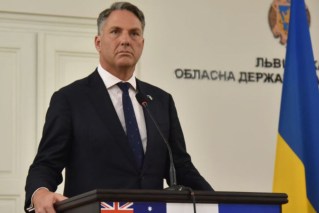Bomber sentenced to death
A US jury has unanimously sentenced Boston bomber Dzhokhar Tsarnaev to death for perpetrating one of the bloodiest assaults in America since the September 11, 2001 attacks.
It took the jury more than 14 hours to choose death over life imprisonment on six of the 17 capital counts for the 21-year-old former university student of Chechen descent, who came to the United States as a child.
• Blood, DNA samples used in bomber trial
• Bomber shopped for milk 20 minutes later
• Botched execution worry

Three people were killed and 264 others wounded, including 17 who lost limbs, in the attack.
The same 12-member panel convicted him on April 8 on all 30 counts relating to the April 15, 2013, bombings, the murder of a police officer, a car jacking and a shootout while on the run.
Three people were killed and 264 others wounded, including 17 who lost limbs, in the twin blasts near the finish line at the north-eastern city’s popular marathon.
Tsarnaev went on the run and was arrested four days later, hiding and injured in a grounded boat on which he had scrawled a bloody message apparently defending the attacks as a means to avenge the US wars in Iraq and Afghanistan.
Two years later, he stood in a dark blazer with his hands clasped before him, showing no emotion as the court clerk read from the death penalty.
The court was silent during the verdict reading. Several jurors sighed heavily.
They had agreed with prosecutors that Tsarnaev had deliberately killed his victims in a premeditated act of terrorism, rejecting defence claims that he had been under the influence of his radicalised older brother
Death penalty opposition
Prominent survivors had opposed the death penalty for Tsarnaev, a teenager at the time, fearing that lengthy appeals would dredge up their agony.
The federal sentence comes despite widespread opposition to the death penalty in the state of Massachusetts, where no-one has been executed since 1947
Survivors, including the parents of the youngest victim eight-year-old Martin Richard, crammed into the gallery to hear the verdict.
Since the federal death penalty was reinstated in 1988, only 79 people have been sentenced to die and only three have been executed, said the Death Penalty Information Centre.
Three other death verdicts were turned into life sentences after new trials were granted.
The decision caps a harrowing, more than two-month trial that saw the court relive the horror of the attacks day after day through grisly videos and heartbreaking testimony from those who lost limbs and loved ones.
The attacks shocked the relatively small north-eastern city of Boston and revived fears of terrorism in the United States after the September 11, 2001 strikes on New York, Washington and Pennsylvania.
Tsarnaev’s lawyers admitted his guilt but said he was manipulated into taking part by his more radical elder brother, 26-year-old Tamerlan, who was shot dead by police on the run.
They deployed dozens of witnesses during a three-week sentencing phase in an attempt to save him from the death penalty.
‘No punishment can balance the scales’
“[Tsarnaev] would never have done this but for Tamerlan. The tragedy would never have occurred but for Tamerlan,” said lawyer Judy Clarke, who has saved some of America’s most notorious convicts from death.
She appealed on the jury to consider Tsarnaev’s young age, his brother’s domineering influence, his parents’ return to Russia in 2012, the affection of his friends and teachers, and his apparent remorse.
“With either option … Tsarnaev dies in prison. The question is when and how,” she said. “There’s no punishment, not even a death sentence that can balance the scales.”
She portrayed an impressionable youth fed Al-Qaeda magazines and lectures by Tamerlan, the true mastermind of the attacks, the ignored younger son of a mentally ill father and an “intimidating,” radicalised mother.
Since then, she said, Tsarnaev had expressed genuine remorse during prison visits by a Roman Catholic nun.
But government prosecutors said Tsarnaev is a callous terrorist living a double life as a pot-smoker enrolled at University of Massachusetts, Dartmouth.
They say he self-radicalised as early as high school and was captivated by the teachings of US-Yemen cleric Anwar al-Awlaki, who was killed in a drone strike in 2011, and pointed to his note justifying the attacks.
“‘No remorse, no apology’ — those are the words of a terrorist convinced he has done the right thing,” US assistant attorney Steven Mellin said.
The jury was required to fill out a 24-page, eight-part verdict form that forced them to weigh a multitude of aggravating and mitigating factors before pronouncing the final verdict.








